A Comparative Analysis: Task and Personnel in Management Theories
VerifiedAdded on 2023/04/23
|5
|1014
|94
Essay
AI Summary
This essay examines the classical perspective of scientific management and the behavioral theories of management, analyzing their implications for the organizational workforce. It evaluates the variables of personnel and task, highlighting the conflict between personnel-oriented and task-oriented outlooks. Classical theorists like Frederick Taylor emphasized task-oriented productivity, viewing personnel as machines with monetary needs, while behavioral theorists such as Elton Mayo prioritized the personnel factor through human relations-oriented management theories. The essay discusses how focusing solely on either variable creates gaps in understanding and emphasizes the importance of harmonizing tasks and personnel to enhance productivity. It also addresses the limitations of scientific management theories in assembly line settings and the development of human resource theory to address human dimensions in the work environment, concluding that integrated policies are needed to achieve harmony between tasks and personnel.
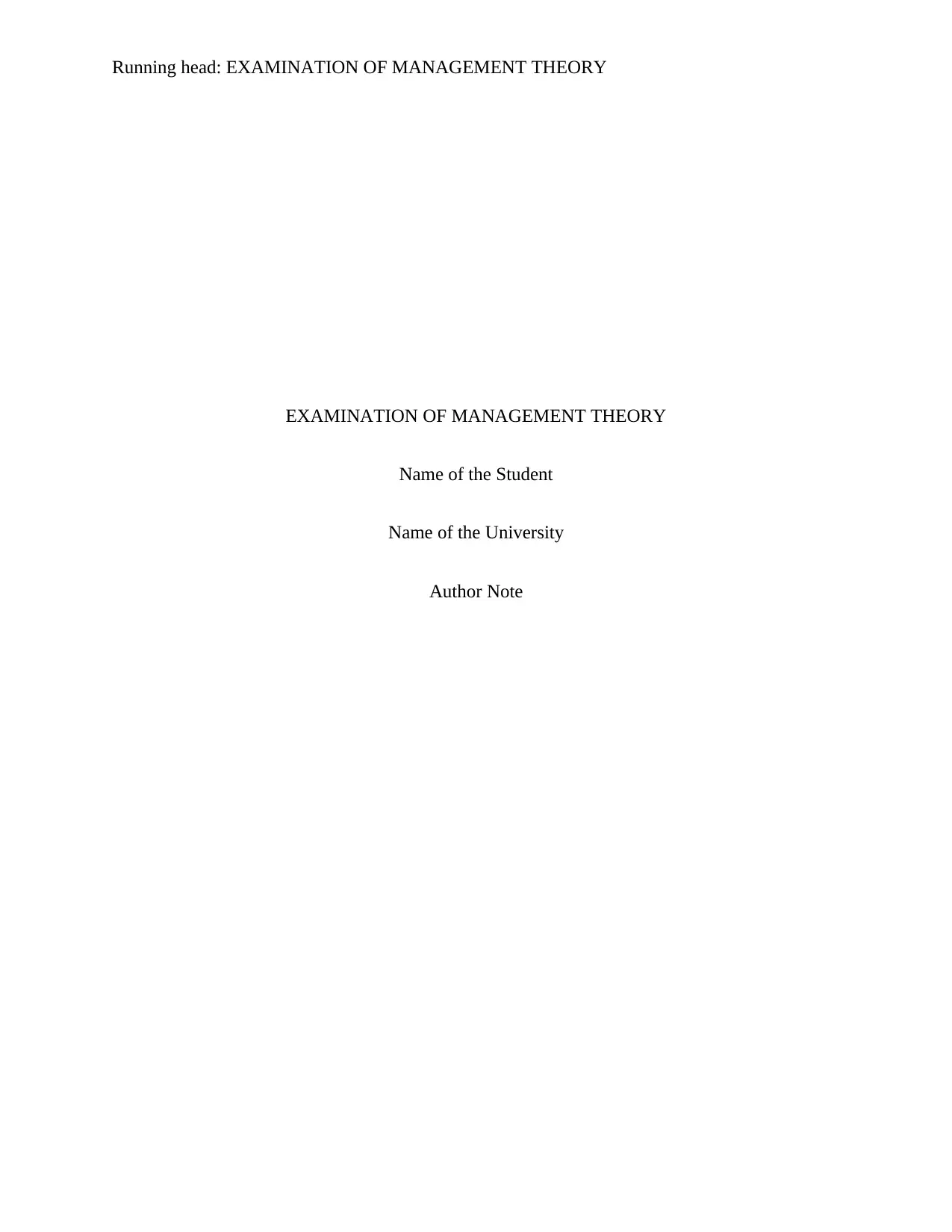
Running head: EXAMINATION OF MANAGEMENT THEORY
EXAMINATION OF MANAGEMENT THEORY
Name of the Student
Name of the University
Author Note
EXAMINATION OF MANAGEMENT THEORY
Name of the Student
Name of the University
Author Note
Paraphrase This Document
Need a fresh take? Get an instant paraphrase of this document with our AI Paraphraser
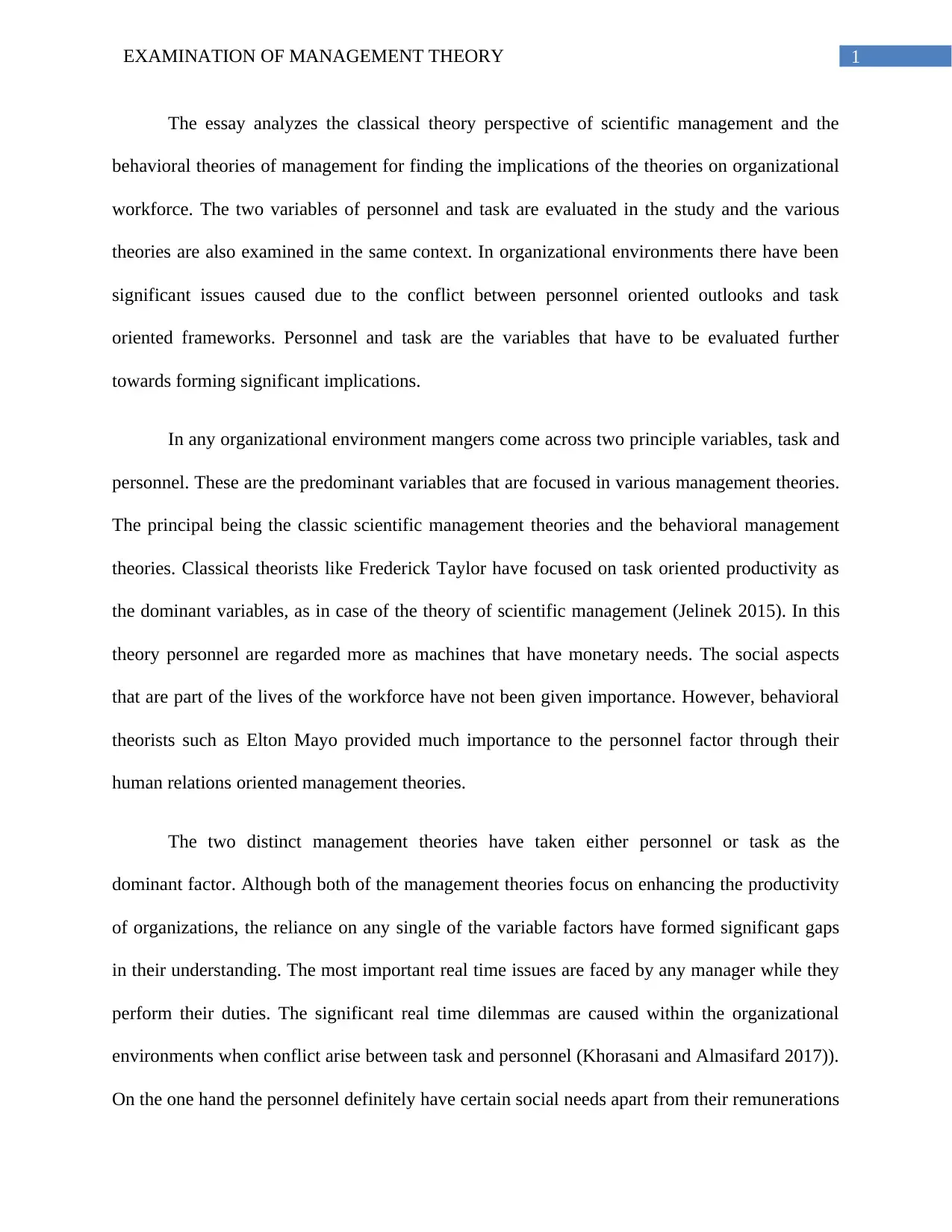
1EXAMINATION OF MANAGEMENT THEORY
The essay analyzes the classical theory perspective of scientific management and the
behavioral theories of management for finding the implications of the theories on organizational
workforce. The two variables of personnel and task are evaluated in the study and the various
theories are also examined in the same context. In organizational environments there have been
significant issues caused due to the conflict between personnel oriented outlooks and task
oriented frameworks. Personnel and task are the variables that have to be evaluated further
towards forming significant implications.
In any organizational environment mangers come across two principle variables, task and
personnel. These are the predominant variables that are focused in various management theories.
The principal being the classic scientific management theories and the behavioral management
theories. Classical theorists like Frederick Taylor have focused on task oriented productivity as
the dominant variables, as in case of the theory of scientific management (Jelinek 2015). In this
theory personnel are regarded more as machines that have monetary needs. The social aspects
that are part of the lives of the workforce have not been given importance. However, behavioral
theorists such as Elton Mayo provided much importance to the personnel factor through their
human relations oriented management theories.
The two distinct management theories have taken either personnel or task as the
dominant factor. Although both of the management theories focus on enhancing the productivity
of organizations, the reliance on any single of the variable factors have formed significant gaps
in their understanding. The most important real time issues are faced by any manager while they
perform their duties. The significant real time dilemmas are caused within the organizational
environments when conflict arise between task and personnel (Khorasani and Almasifard 2017)).
On the one hand the personnel definitely have certain social needs apart from their remunerations
The essay analyzes the classical theory perspective of scientific management and the
behavioral theories of management for finding the implications of the theories on organizational
workforce. The two variables of personnel and task are evaluated in the study and the various
theories are also examined in the same context. In organizational environments there have been
significant issues caused due to the conflict between personnel oriented outlooks and task
oriented frameworks. Personnel and task are the variables that have to be evaluated further
towards forming significant implications.
In any organizational environment mangers come across two principle variables, task and
personnel. These are the predominant variables that are focused in various management theories.
The principal being the classic scientific management theories and the behavioral management
theories. Classical theorists like Frederick Taylor have focused on task oriented productivity as
the dominant variables, as in case of the theory of scientific management (Jelinek 2015). In this
theory personnel are regarded more as machines that have monetary needs. The social aspects
that are part of the lives of the workforce have not been given importance. However, behavioral
theorists such as Elton Mayo provided much importance to the personnel factor through their
human relations oriented management theories.
The two distinct management theories have taken either personnel or task as the
dominant factor. Although both of the management theories focus on enhancing the productivity
of organizations, the reliance on any single of the variable factors have formed significant gaps
in their understanding. The most important real time issues are faced by any manager while they
perform their duties. The significant real time dilemmas are caused within the organizational
environments when conflict arise between task and personnel (Khorasani and Almasifard 2017)).
On the one hand the personnel definitely have certain social needs apart from their remunerations
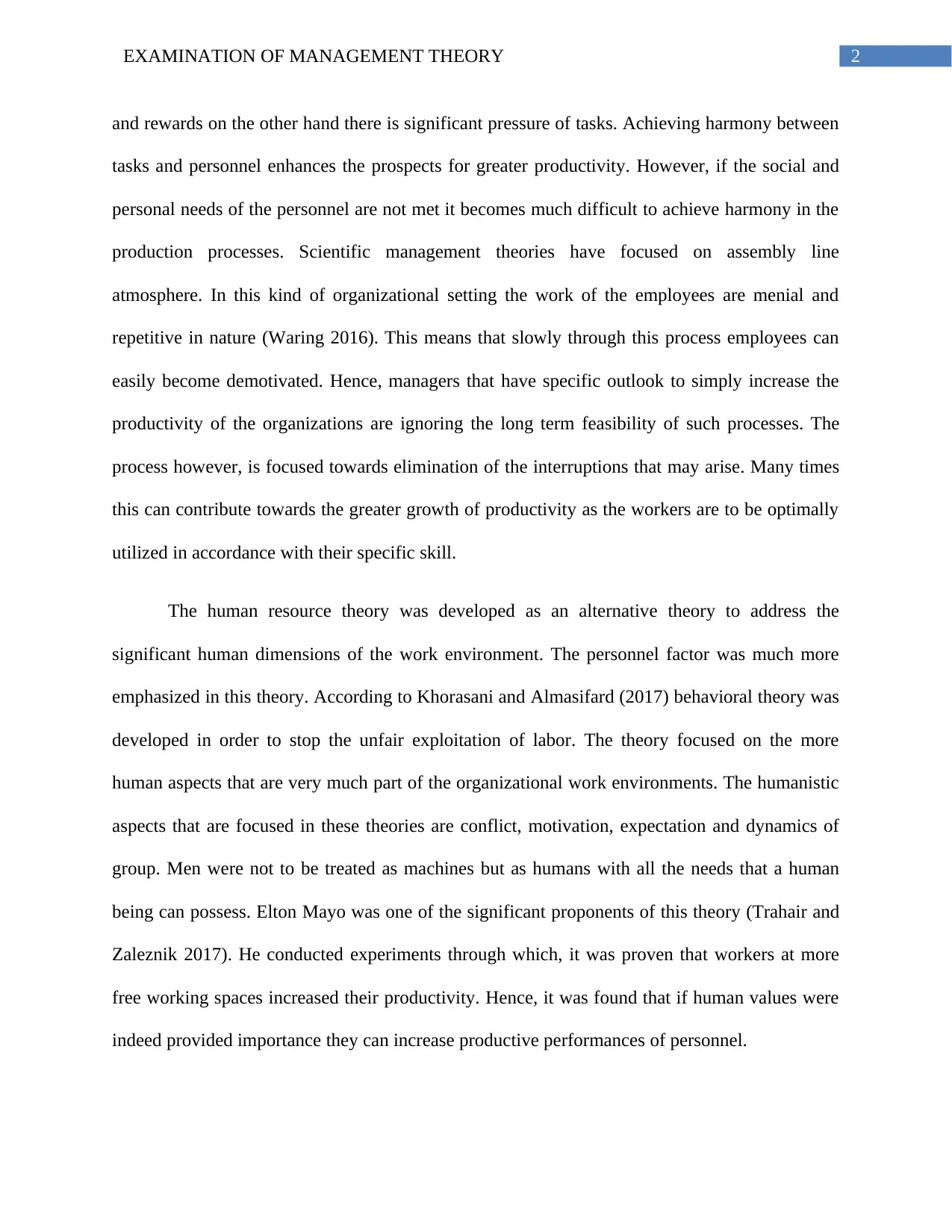
2EXAMINATION OF MANAGEMENT THEORY
and rewards on the other hand there is significant pressure of tasks. Achieving harmony between
tasks and personnel enhances the prospects for greater productivity. However, if the social and
personal needs of the personnel are not met it becomes much difficult to achieve harmony in the
production processes. Scientific management theories have focused on assembly line
atmosphere. In this kind of organizational setting the work of the employees are menial and
repetitive in nature (Waring 2016). This means that slowly through this process employees can
easily become demotivated. Hence, managers that have specific outlook to simply increase the
productivity of the organizations are ignoring the long term feasibility of such processes. The
process however, is focused towards elimination of the interruptions that may arise. Many times
this can contribute towards the greater growth of productivity as the workers are to be optimally
utilized in accordance with their specific skill.
The human resource theory was developed as an alternative theory to address the
significant human dimensions of the work environment. The personnel factor was much more
emphasized in this theory. According to Khorasani and Almasifard (2017) behavioral theory was
developed in order to stop the unfair exploitation of labor. The theory focused on the more
human aspects that are very much part of the organizational work environments. The humanistic
aspects that are focused in these theories are conflict, motivation, expectation and dynamics of
group. Men were not to be treated as machines but as humans with all the needs that a human
being can possess. Elton Mayo was one of the significant proponents of this theory (Trahair and
Zaleznik 2017). He conducted experiments through which, it was proven that workers at more
free working spaces increased their productivity. Hence, it was found that if human values were
indeed provided importance they can increase productive performances of personnel.
and rewards on the other hand there is significant pressure of tasks. Achieving harmony between
tasks and personnel enhances the prospects for greater productivity. However, if the social and
personal needs of the personnel are not met it becomes much difficult to achieve harmony in the
production processes. Scientific management theories have focused on assembly line
atmosphere. In this kind of organizational setting the work of the employees are menial and
repetitive in nature (Waring 2016). This means that slowly through this process employees can
easily become demotivated. Hence, managers that have specific outlook to simply increase the
productivity of the organizations are ignoring the long term feasibility of such processes. The
process however, is focused towards elimination of the interruptions that may arise. Many times
this can contribute towards the greater growth of productivity as the workers are to be optimally
utilized in accordance with their specific skill.
The human resource theory was developed as an alternative theory to address the
significant human dimensions of the work environment. The personnel factor was much more
emphasized in this theory. According to Khorasani and Almasifard (2017) behavioral theory was
developed in order to stop the unfair exploitation of labor. The theory focused on the more
human aspects that are very much part of the organizational work environments. The humanistic
aspects that are focused in these theories are conflict, motivation, expectation and dynamics of
group. Men were not to be treated as machines but as humans with all the needs that a human
being can possess. Elton Mayo was one of the significant proponents of this theory (Trahair and
Zaleznik 2017). He conducted experiments through which, it was proven that workers at more
free working spaces increased their productivity. Hence, it was found that if human values were
indeed provided importance they can increase productive performances of personnel.
⊘ This is a preview!⊘
Do you want full access?
Subscribe today to unlock all pages.

Trusted by 1+ million students worldwide
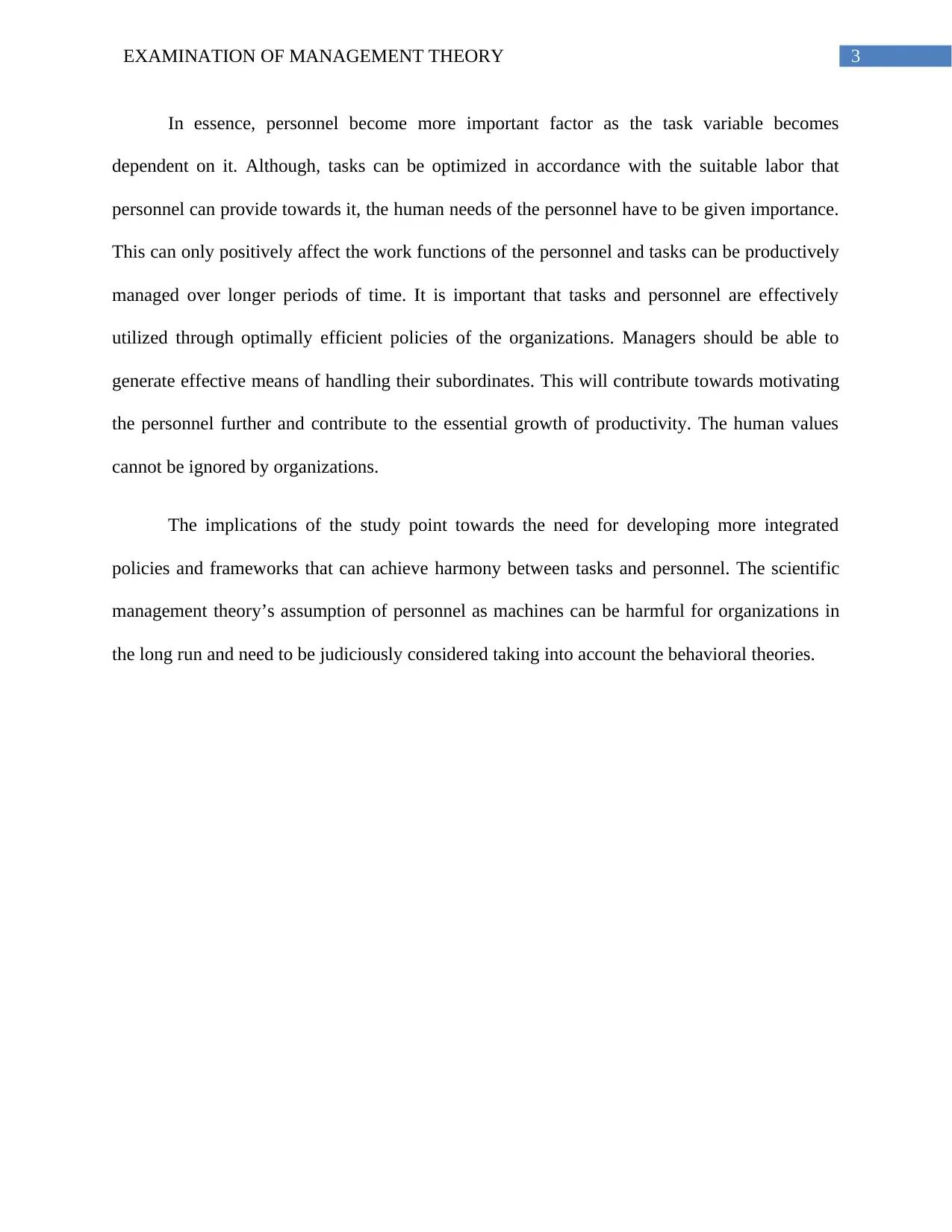
3EXAMINATION OF MANAGEMENT THEORY
In essence, personnel become more important factor as the task variable becomes
dependent on it. Although, tasks can be optimized in accordance with the suitable labor that
personnel can provide towards it, the human needs of the personnel have to be given importance.
This can only positively affect the work functions of the personnel and tasks can be productively
managed over longer periods of time. It is important that tasks and personnel are effectively
utilized through optimally efficient policies of the organizations. Managers should be able to
generate effective means of handling their subordinates. This will contribute towards motivating
the personnel further and contribute to the essential growth of productivity. The human values
cannot be ignored by organizations.
The implications of the study point towards the need for developing more integrated
policies and frameworks that can achieve harmony between tasks and personnel. The scientific
management theory’s assumption of personnel as machines can be harmful for organizations in
the long run and need to be judiciously considered taking into account the behavioral theories.
In essence, personnel become more important factor as the task variable becomes
dependent on it. Although, tasks can be optimized in accordance with the suitable labor that
personnel can provide towards it, the human needs of the personnel have to be given importance.
This can only positively affect the work functions of the personnel and tasks can be productively
managed over longer periods of time. It is important that tasks and personnel are effectively
utilized through optimally efficient policies of the organizations. Managers should be able to
generate effective means of handling their subordinates. This will contribute towards motivating
the personnel further and contribute to the essential growth of productivity. The human values
cannot be ignored by organizations.
The implications of the study point towards the need for developing more integrated
policies and frameworks that can achieve harmony between tasks and personnel. The scientific
management theory’s assumption of personnel as machines can be harmful for organizations in
the long run and need to be judiciously considered taking into account the behavioral theories.
Paraphrase This Document
Need a fresh take? Get an instant paraphrase of this document with our AI Paraphraser
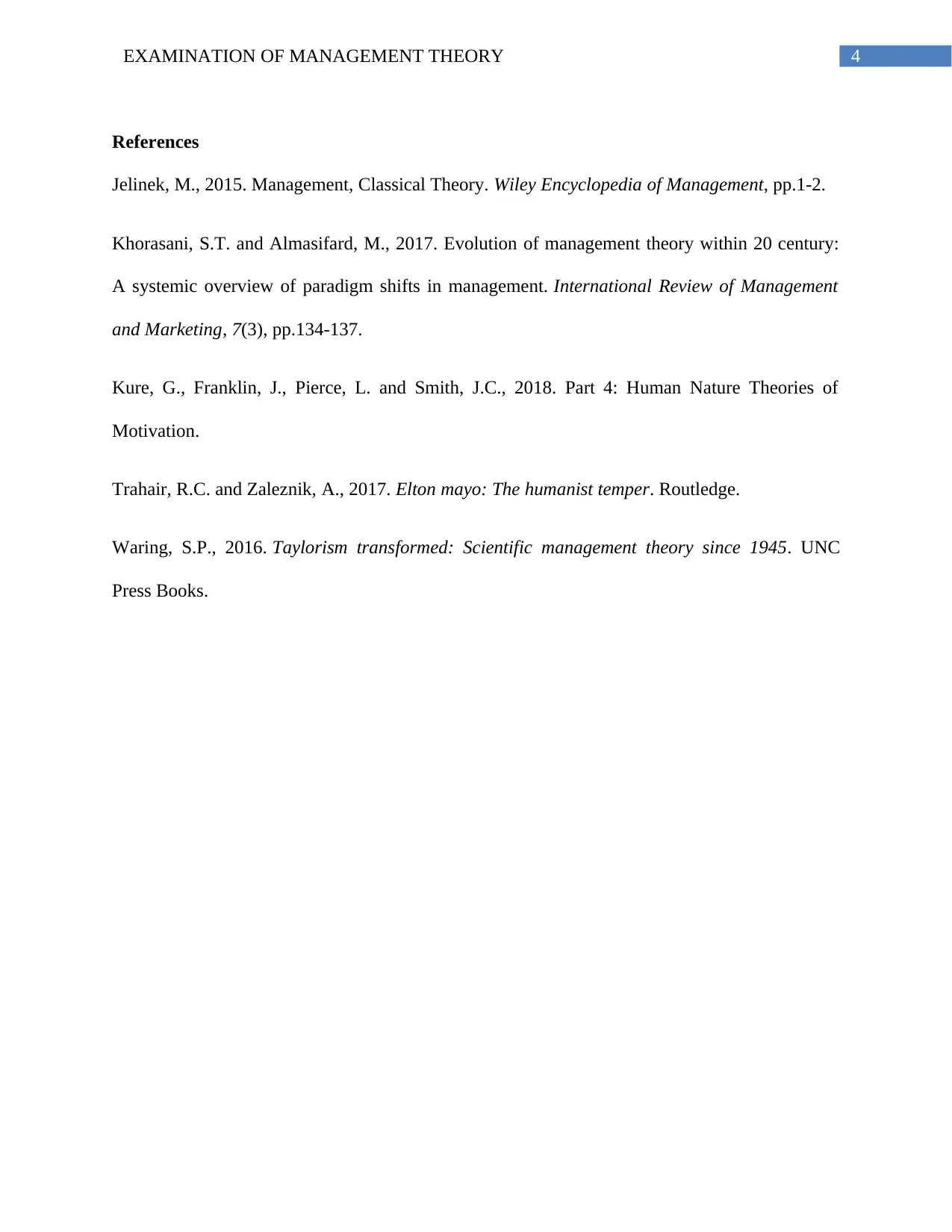
4EXAMINATION OF MANAGEMENT THEORY
References
Jelinek, M., 2015. Management, Classical Theory. Wiley Encyclopedia of Management, pp.1-2.
Khorasani, S.T. and Almasifard, M., 2017. Evolution of management theory within 20 century:
A systemic overview of paradigm shifts in management. International Review of Management
and Marketing, 7(3), pp.134-137.
Kure, G., Franklin, J., Pierce, L. and Smith, J.C., 2018. Part 4: Human Nature Theories of
Motivation.
Trahair, R.C. and Zaleznik, A., 2017. Elton mayo: The humanist temper. Routledge.
Waring, S.P., 2016. Taylorism transformed: Scientific management theory since 1945. UNC
Press Books.
References
Jelinek, M., 2015. Management, Classical Theory. Wiley Encyclopedia of Management, pp.1-2.
Khorasani, S.T. and Almasifard, M., 2017. Evolution of management theory within 20 century:
A systemic overview of paradigm shifts in management. International Review of Management
and Marketing, 7(3), pp.134-137.
Kure, G., Franklin, J., Pierce, L. and Smith, J.C., 2018. Part 4: Human Nature Theories of
Motivation.
Trahair, R.C. and Zaleznik, A., 2017. Elton mayo: The humanist temper. Routledge.
Waring, S.P., 2016. Taylorism transformed: Scientific management theory since 1945. UNC
Press Books.
1 out of 5
Related Documents
Your All-in-One AI-Powered Toolkit for Academic Success.
+13062052269
info@desklib.com
Available 24*7 on WhatsApp / Email
![[object Object]](/_next/static/media/star-bottom.7253800d.svg)
Unlock your academic potential
Copyright © 2020–2026 A2Z Services. All Rights Reserved. Developed and managed by ZUCOL.




